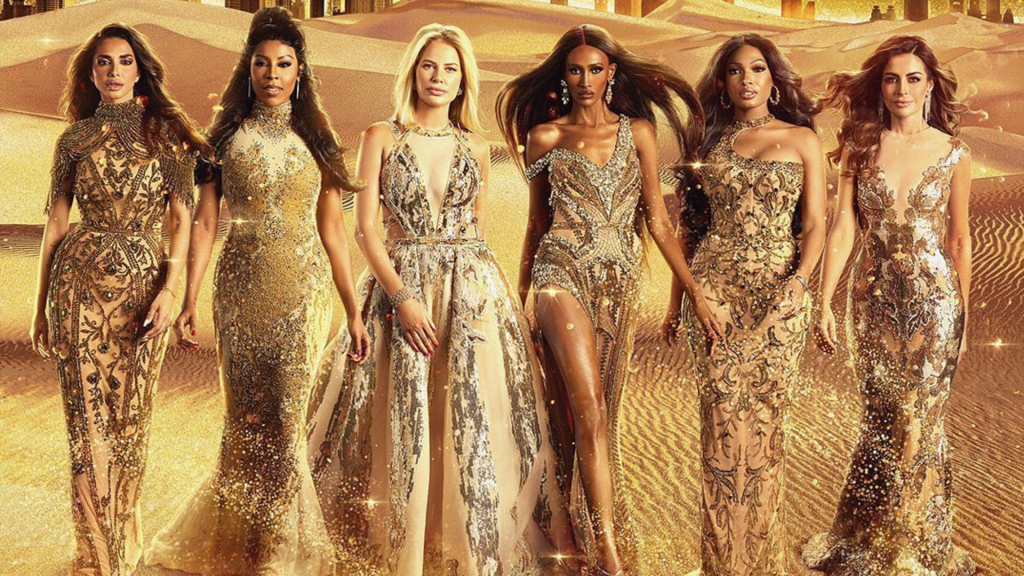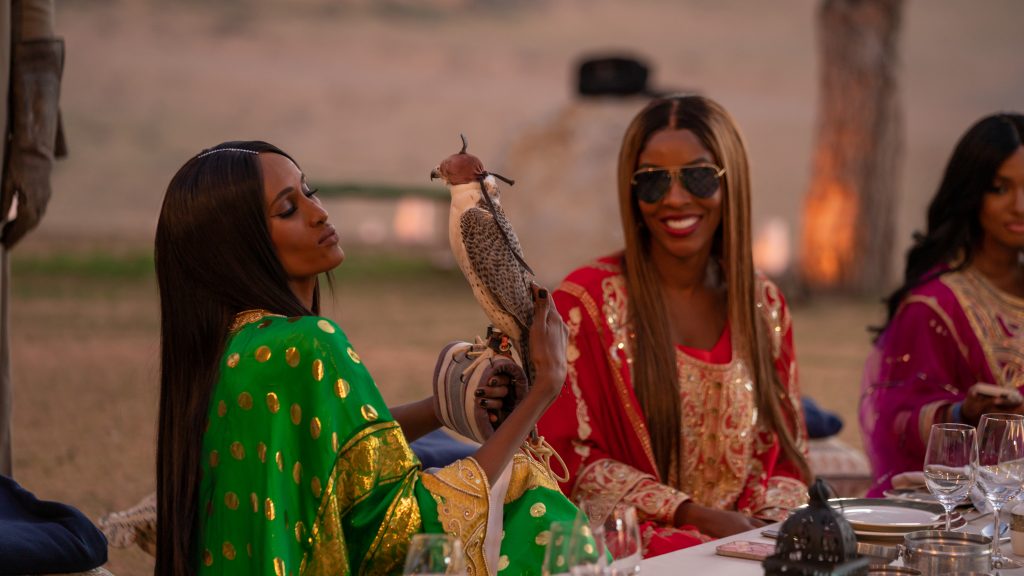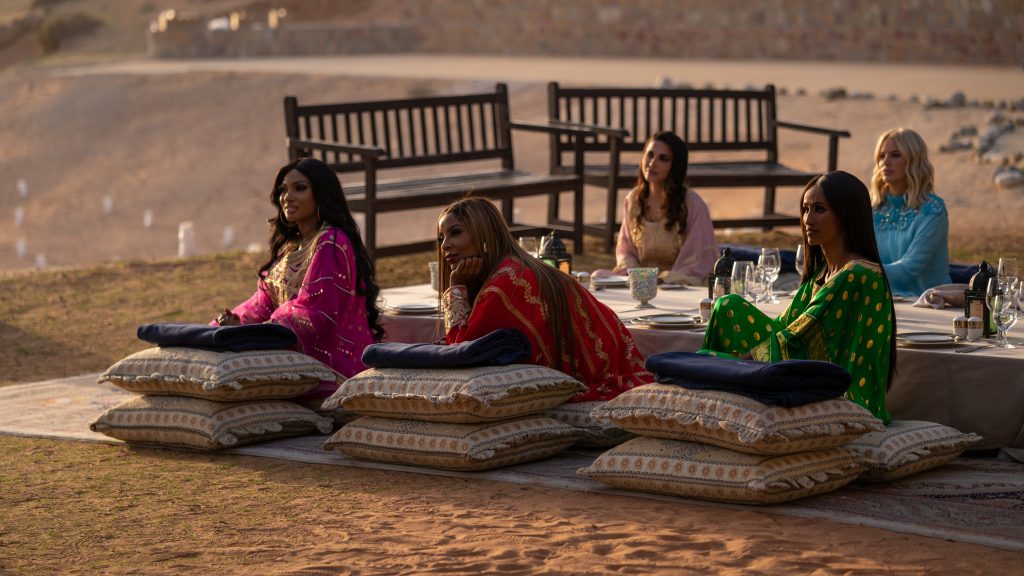When I confess my deep love – nay, obsession – with The Real Housewives franchise, the reactions range from disgust to rage to total agreement. The occasional few admit that they appreciate these types of shows as a “guilty pleasure”, but I’m also often met with an incredulous, “What is a Lisa Vanderpump?” from others.
For years they’ve provided North America with an outlet to foster a seething hatred of women, but as the now-ubiquitous Housewives franchise continues to grow – and makes its way to Dubai, no less – the reality reveals something different. Real Housewives is many things – it’s entertainment, it’s escapism, it’s a sociological experiment – but ‘bad for feminism’ it ain’t.

Supplied
The show has been a lucrative endeavour, the scope not stopping at the boundaries of the United States. Its success prompted Bravo to go global and expand to the Middle East; thus, The Real Housewives of Dubai was born. Aired on June 1, Nina Ali, Chanel Ayan, Caroline Brooks, Dr. Sara Al Madani, Lesa Milan, and network Caroline Stanbury graced our screens as the newest cast of this undeniable institution.
With viewers in the millions, spin-off shows, merchandise, and cast appearances that extend far beyond Bravo, the presence of the franchise and its “ladies who lunch” cannot be ignored. Admittedly, The Real Housewives doesn’t have the intellectual dexterity of a documentary feature, but it’s no less intelligent than shows viewers readily admit to loving without guilt – And Just Like That, Schitt’s Creek or Friends, anyone?
Any fans of the franchise who have watched a full episode can attest: these women aren’t just featured shopping all day or talking behind each other’s backs. It’s a show about friendship; it’s a show about being a mother; it’s a show about women building an empire – with the occasional gala dinner thrown in. Making women the entire focus of any TV program is something that deserves recognition. Housewives is a show about women, for women. And that makes people uncomfortable. Will we ever move towards a culture in which women are not punished for putting their lives in the public sphere on their own terms?

Supplied
Many think this genre of TV is harming the world, making us more stupid, and setting women back 20 years. Feminised art forms like gossip, celebrity, pop culture, and, of course, reality shows, are looked down on, but the hard fact is The Real Housewives is one of the biggest, glitziest, and most profitable reality shows on TV. There are many facets of this formidable force that prove it can be an empowering take on two traditionally mutually exclusive terms: feminism and femininity.
Let’s take it back to 2005 when The Real Housewives of Orange County aired. There were few television shows that featured all-female casts, telling real stories – their stories – that showed us messy houses, divorce, domestic abuse, addiction, and financial collapse. The portrayal of problems that were not much talked about, and even less so in the context of wealthy women, was powerful and palpable. As the show went on and the franchise grew, so did the housewives’ income. They now have brand opportunities; mega-media exposure can be translated into dollars.
Andy Cohen once said that the term “Housewives” is meant to be tongue-and-cheek. In fact, most of the women featured in the franchise are not housewives at all, many are the breadwinners with extremely successful careers as entrepreneurs (Bethenny Frankel), actresses (Denise Richards), and models (Yolanda Hadid).
In some instances, the show even offers a lucrative top-up for the already famous (Kathy Hilton). But let’s just say, for a moment, that they were ‘just’ a housewife. Let’s say they are the stay-at-home mum whose sole responsibility is to raise the kids. What is the problem with that? How has The Real Housewives become a space for misogynistic discourse to thrive, where the value we place on an individual is based on their earning potential and equality becomes synonymous with pay? God forbid we think about all the things that women offer within the home as something that can be teachable and valuable…
It’s still easy to visualize those two clichés — the feminist and the housewife — in clean opposition to each other, yet the lexicon around both of these terms have radically changed over the years — the housewife even more so than the feminist. The word “housewife” is now just as likely to evoke extravagance, indulgence, and freedom as it is domestic servitude. The cast of Bravo’s franchise is so far removed from housewifery that the word exudes more ironic satire than it does perpetuate stereotypical gender norms.
“Feminised art forms like gossip, celebrity, pop culture, and, of course, reality shows, are looked down on, but the hard fact is The Real Housewives is one of the biggest, glitziest, and most profitable reality shows on TV.“

Supplied
Reality TV has been sanctioned as a feminized property, to be consumed only by women and marginalized demographics. The ritualistic tweeting and sharing housewife memes that run adjacent to the show have made it a source of sweet relief and entertainment for viewers – how is this any different to, let’s say, the Champion’s League? My social media feeds are awash with impassioned men whenever there’s a big sporting match going on, but us? Well, we’re feminine and frivolous, of course. Sports – reality’s closest counterpart within the binary – is for big, strong men, but reality TV is for the hysterical and emotional.
I’ve grown used to defending my passion for The Real Housewives to men who can think of nothing better than watching people kick a ball up and down a pitch for hours on end, or race very fast cars around in circles. Yes, I say resignedly, It’s sooo embarrassing, but I’m addicted.
Yes, much of the discourse in the show largely surrounds the housewives’ obsessions with looking young and beautiful, but newsflash: women in the real world are taught unequivocally to age gracefully, and to do it quietly. Amongst our growing admiration of plus-size models, our protests against diet culture, and our education around Photoshop machinations like FaceTune, we’ve forgotten about the glorification of feminine youth.

The Real Housewives is one of the first reality franchises I’ve watched that normalizes conversations about female ageing. It’s an ironic twist of fate, really, having to point out to people: if reality TV has at times been archaic and anti-feminist, it’s largely because those were and are the times we live in.
The Real Housewives is a format that facilitates difficult but necessary discussions. The focus of these shows is not—despite how it may seem to the outsider—exclusively on appearance, wealth, and class. The density and nuance of these women’s lives, consumed by those who love to see powerful, shameless women do and say what she wants, is what makes these shows so successful.
Click here to read Cosmo ME’s Summer Issue online.
Lead Graphics by @outofcanvas.

